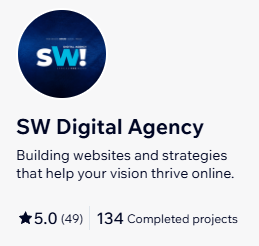How to Build a Strong Website for Your Small Business
- Lucas Santana

- May 15, 2025
- 3 min read
Creating a robust website for your small business is crucial in today's digital age. A well-designed website not only showcases your products and services but also enhances your credibility and helps attract new customers. In this blog post, we'll explore essential steps to build a strong website that meets your business’s needs.
Understanding Small Business Websites
A small business website serves as an online hub for your brand. It is the first point of contact for many potential customers. Therefore, it must be user-friendly, informative, and visually appealing. Here are some key elements to consider when developing your website:
Domain Name: Select a domain name that reflects your business. It should be easy to remember and type.
Hosting Provider: Choose a reliable hosting provider that offers good uptime and support.
Website Builder: Platforms like WordPress, Wix, or Squarespace make it easy to create and manage your website without extensive coding knowledge.

Essential Features of Small Business Websites
When building your small business website, there are several essential features you should include to enhance functionality and user experience:
Responsive Design: Ensure your website looks good on all devices, including smartphones and tablets. A responsive design adapts to various screen sizes, making navigation effortless.
Clear Navigation: Users should easily find information on your site. Use a simple menu with clearly labeled sections.
Contact Information: This should be easy to locate. Consider placing it in the header or footer. Providing a contact form can simplify the process for potential clients.
About Page: Here, you can share your story, values, and mission. This helps build a connection with visitors.
Blog Section: Maintaining a blog can improve your SEO and establish your authority in your niche.
Social Media Links: Including links to your social media profiles can enhance your online presence and allow for easy sharing of your content.

How to Increase Online Presence for Business?
Building your website is just one part of establishing a strong online presence. Here are effective strategies to increase your visibility:
Search Engine Optimization (SEO): Incorporating relevant keywords into your content can improve your website's ranking on search engines. Tools like Google Keyword Planner can help you find suitable keywords related to your industry.
Content Marketing: Create valuable and informative content that resonates with your target audience. This can drive organic traffic to your site. For example, product tutorials, industry news, or customer testimonials can all be engaging content types.
Social Media Engagement: Actively participate on social media platforms. Share your content and engage with your audience through comments and direct messages. This expands your reach and fosters a sense of community.
Email Marketing: Building an email list allows you to keep in touch with customers and share news, promotions, and blog posts. Sending regular newsletters can enhance ongoing engagement.

Optimizing User Experience
User experience (UX) is integral when building a website. Here are actionable tips to enhance UX:
Fast Loading Times: Optimize images and reduce the number of plugins to improve your site's speed. Studies show that 47% of users expect a web page to load in two seconds or less.
Consistent Branding: Use a consistent color palette, fonts, and imagery throughout your website to create a cohesive brand identity.
Accessible Design: Ensure your site is accessible to everyone, including people with disabilities. This can involve using alt text for images and ensuring that your site can be navigated using a keyboard.
Effective Calls-to-Action (CTAs): Guide visitors to take desired actions with clear and compelling CTAs. Phrases like “Sign Up” or “Get Started” can prompt engagement.
Analytics: Utilize tools like Google Analytics to track your website’s performance. Monitoring metrics such as bounce rates, page views, and user demographics can help you make data-driven decisions for improvement.
Conclusion to Building Your Website
Building a strong website for your small business is a vital investment in your future. By focusing on essential features, optimizing user experience, and employing effective marketing strategies, you can significantly enhance your business online presence.
Your website is more than just an online brochure; it is a powerful tool that can help grow your business and connect you with potential customers. For more detailed insights into enhancing your business online presence, visit SW Digital Agency's blog.
Now is the time to take action! Evaluate your current website or start building a new one. With the right tools and strategies, you can create a thriving online presence for your business.





Comments